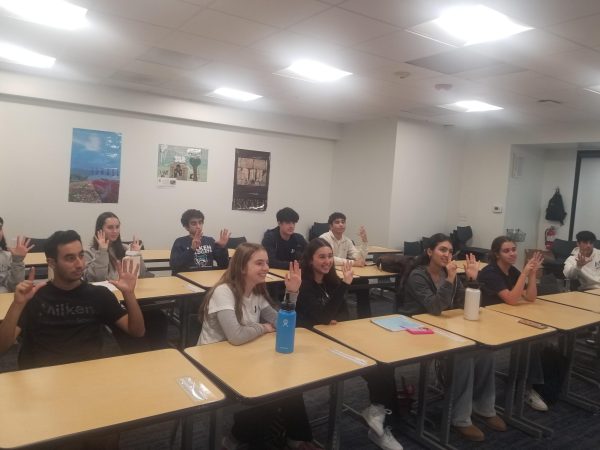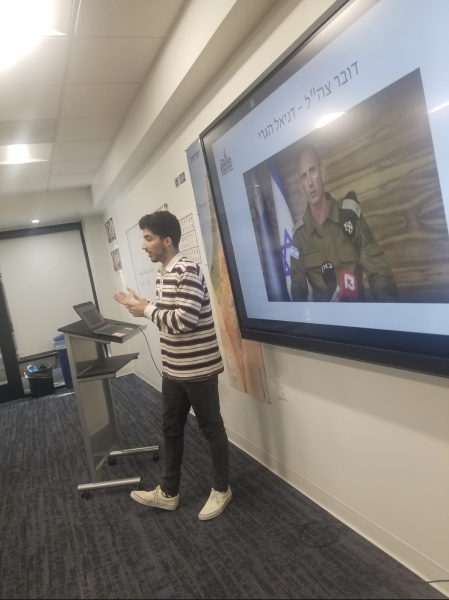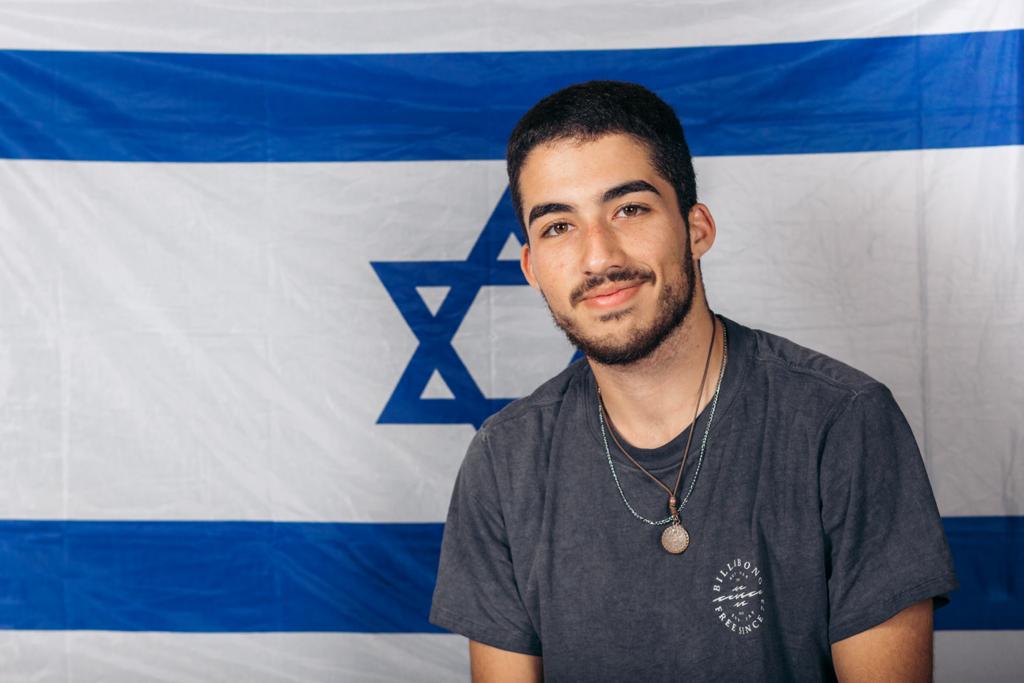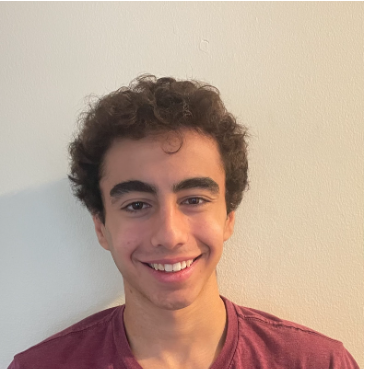During the 18 year old Israeli Shaked Bar’s visit to Palos Verdes High School, he spoke in front of a large group of students from multiple classes about what he described as his “Israeli story.” The presentation covered his home city, hobbies, food he loves to eat, and his purpose in Los Angeles. As he spoke, The Jewish Federation for Greater Los Angeles’ Assistant Director for Israel Education Dr. Sharon Furman-Lee accompanied him and saw the students realize: “Wow, Israelies are just like us Americans.” The American students were able to see the perspective of an Israeli teen and grow more connected with Israeli culture and values, even if they had no prior knowledge about the country.
18-year-olds such as Bar who were born in Israel live a vastly different experience from their teenage counterparts in America. They first serve the interests of their country before beginning to work towards their own individual careers. At this age, Israelis decide what position within the IDF they want to pursue and enter intense training only a few months after graduating high school.
However, some Israelis like Bar, choose a different path. One that requires an alternative type of independence, patience, and willingness to serve the Jewish homeland and community they have been raised within. In Israel, thousands of teenagers every year choose to commit to an entire year of community service or a Shnat Sherut (in Hebrew שנת שירות) in which they participate in volunteer work that benefits Israel. This is completed after graduating high school and before beginning their mandatory military service.
These teenagers are nicknamed Shin-Shins after the first letter shin in the Hebrew translation of “year of service” (שנת שירות). This is often seen as an opportunity by Israeli teens to meet new people and make a positive impact in a place and community they have never been to before.
The Shin-Shin Shaked Bar, is from the small town of Kiryat Malakhi in southern Israel and is currently taking a community service gap year in Los Angeles before returning to Israel in August to serve in the IDF.

He found this opportunity to come to the states through The Jewish Agency for Israel Shlichim program that sends 200 Israeli teenagers every year to many parts of the world to serve a local Jewish community. Bar saw this program as a chance to connect with “a community I have never been to” and viewed it as a unique way to serve the Jewish people.
The Jewish Agency For Israel sent Bar to Los Angeles believing the Jewish community here would suit him well. He then chose to volunteer in the Jewish Federation of Greater Los Angeles which has sent him to numerous schools, both Jewish and non-Jewish to speak about “what it is like being a teenager in Israel” and the IDF as well.
He has also given lessons to Milken Hebrew classes numerous times over the past month. Bar’s service has helped educate both Jewish and non-Jewish high school students on the perspective of an Israeli citizen and he hopes to “make people think twice before saying something bad about Israel.”
Throughout Bar’s childhood, he was a member of the Israeli scouts, a popular youth movement in Israel dedicated to bringing local communities together. While in the scouts, he made what he describes as “true friends” and many of his counselors were other Shin Shins who completed their gap year of service within Israel. These Shin-Shins inspired Bar to “help other people if I can” by becoming a Shin-Shin himself.
Dr. Furman-Lee who has accompanied Shaked to the presentations he has given to schools this year, says that having a Shin-Shin working in the Federation is a “great success” as having a young teenager like Bar speaking with middle to high school students allows for them to connect with him more easily.
Dr. Furman-Lee works in helping provide educational resources for ten day trips to Israel led by the Jewish Federation of Greater Los Angeles that teachers in non-Jewish schools in LA can join free of charge. These trips educate teachers about Israeli culture, the country’s religious importance, past conflicts, and current events. The teachers who attend this trip then make a commitment to teach their students about Israel for one week per year for the next five school years. Bar’s presentations to public schools are then given to students who are taught by teachers that participated in the trip to Israel.
During his initial presentations such as the one in Palos Verdes High school, he focused more on life as a teenager in Israel, his personal interests, and the values he was raised with in Israel. Dr. Furman-Lee says this helped students become “more open minded to Israel” and would help them find common ground with the country and its people.

However, since the events taking place on October 7th, a shift has taken place in the lessons Bar and Dr. Furman-Lee have presented to schools in Los Angeles. Soon after the war in Israel began, Bar and Dr. Furman Lee went to Young Oak Kim Academy middle school where they focused more on the goals of the IDF, the history of the Israel-Palestinian conflict, and how this all relates to the current war in Gaza. This change was made to provide students with a short education about Israel that will help them see the larger historical picture that lead up to October 7th.
Bar described students to be “judgemental but that they still want to know more.” During one of his presentations, he explained to a group of public school students that almost every Israeli is obligated to serve in the IDF. A student then asked him, “Do you really want to serve, or do you just have to?” This moment symbolized the American and Israeli cultural divide for Bar the most. To him, serving in the army seemed like something that was always planned in his life and whether he wanted to serve or not, did not truly matter.
He responded: “I need to serve in the army. Unlike in America, Israel is surrounded by enemies and it needs its people to serve.” Bar then described the student to show a clearer understanding of the average Israeli perspective and saw that a stronger connection with him was made.
Bar and Dr. Furman Lee have also taught multiple lessons together at Milken in Hebrew classes that have focused on the structure of the IDF and its importance to Israel during the current conflict. Through these presentations, students researched a single unit from a specific branch of the IDF, presenting their findings to the rest of the class.
Bar also described Milken students to be “amazing because they think differently about my experience and they are really curious about my past in Israel and try to think about what if they were in my situation.” In the months of December and January, Bar visited Milken five times and presented a lesson to two to three Hebrew classes each time he came.
Throughout Bar’s time in Los Angeles, Dr. Furman-Lee described him to be a “great help.” She says that he constantly “prepares for his presentations” and finds new “ideas” to improve the educational effectiveness during his visits to schools. She has also seen him grow into a confident English speaker with each presentation he has given.
In August, Bar will return to Israel though, and start training to become an IDF soldier soon after. He says that he wants to become an “IDF spokesperson” whose job it is to release information about the IDF’s actions to the public.
Bar’s story is a special one that is fueled by a love for Judaism, curiosity about the world, and willingness to serve his country in a unique fashion. The service he has provided in Los Angeles shows that forming a proper educational connection with young students who are both Jewish and non-Jewish is crucial in shedding light on the true positive image of Jews and Israelis everywhere.




